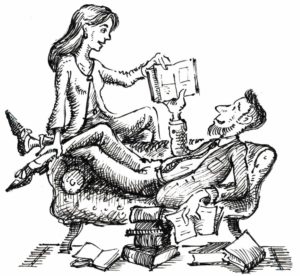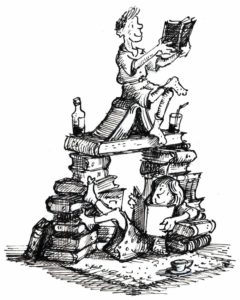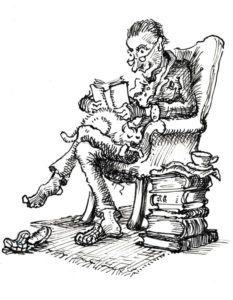1940s: Dunkirk Spirit & the Blitz
Pigeon Post [1940]
Arthur Ransome (1884-1967)
A classic summer holiday adventure story for children, in Pigeon Post, the Swallows and Amazons reunite with Dick and Dorothea set off in search of a lost goldmine, while trying to stay under the radar of the suspicious Squashy Hat.
Fame Is The Spur [1940]
Howard Spring (1889-1965)
Set against the backdrop of 1890 to 1950, this novel chronicles its social and political changes. It is the rags to riches story of a charming, ambitious and arrogant cabinet minister and his beautiful wife, not easily intimidated, who is a dedicated Suffragette with her own agenda.
The Horse’s Mouth [1944]
Joyce Cary (1888-1957)
The third in a trilogy, this book follows the adventures of Gulley Jimson, an artist who would exploit his friends and acquaintances to earn a penny. His creative genius is balanced by a remarkable appetite for destruction. Is Jimson a genius, a drunken ne’er-do-well or a has-been?
At Mrs Lippincote’s [1945]
Elizabeth Taylor (1912-1975)
Mrs. Lippincote’s house is a reminder of the certainties that have vanished with the war – mahogany furniture and sepia photographs. Julia has joined her RAF husband Roddy at Mrs. Lippincote’s. Although she can accept the snobbishness of RAF life, Julia’s honesty and sense of humour prevent her from taking her role as seriously as her husband might wish.
In Youth Is Pleasure [1945]
Denton Welch (1915-1948)
One of artist Denton Welch’s three novels, a beautiful and unassuming coming-of-age novel, with keen observation of the emotions of Orvil Pym, fifteen-years-old and on summer vacation after his first miserable year at public school.
Brideshead Revisited [1945]
Evelyn Waugh (1903-1966)
Set in the golden age before the Second World War, it tells of Charles Ryder’s enchantment, whilst at Oxford, with the rich and privileged Lord Sebastian Flyte and family. The pair are close friends after spending the summer together, and in time Charles becomes infatuated with the sister of Sebastian. All does not end well, as Charles finally recognizes his social and spiritual distance from them.
London Belongs To Me [1945]
Norman Collins (1907-1982)
The prospect of war hangs over London in 1938, but the city does not stop. Deadpan humour, ordinary characters – the buttoned-up clerk, an actress in decline, a tinned food-lover, a widowed landlady (whose head is turned by a new lodger, a self-styled ‘Professor of Spiritualism’ and a flash young mechanic whose foray into stolen cars leads somewhere much worse – are depicted in the cityscape.
The Moving Toyshop [1946]
Edmund Crispin (1921-1978)
Dedicated to poet chum Philip Larkin, an iconic detective story set in Oxford.
Titus Groan [1946]
Mervyn Peake (1911-1968)
Supremely fantastical and macabre, even dreamlike, this extraordinary novel – the first of a trilogy – is a sustained flight of imagination. Titus Groan is heir to Lord Sepulchrave and will inherit the rambling stone and mortar that form Gormenghast Castle and its kingdom.
The Slaves Of Solitude [1947]
Patrick Hamilton (1904-1962)
Set during World War Two, we follow the adventure of the inhabitants in a claustrophobic boarding house. With an improbable heroine, it is one of the funniest books ever written about being lonely.
One Fine Day [1947]
Mollie Panter-Downes (1906-1977)
Summer 1946, with the ghosts of barbed wire rustling in nearby fields reminding Laura and Stephen that, after years of separation, something of life has evaporated. A portrait of the aftermath of war and its effect upon a marriage, and of the gradual yet significant change in the nature of English middle-class life.
Manservant And Maidservant [1947]
Ivy Compton-Burnett (1884-1969)
Horace Lamb is a skinflint, sadist and tyrant, whose children fear and hate him and whose wife is planning to elope – undergoes a change of heart. Only then do his real difficulties begin. Compton-Burnett was an artful and elegant writer, whose comedy and sense of manners made her Austen’s literary heir.
Cry, The Beloved Country [1948]
Alan Paton (1903-1988)
A father seeks his delinquent son in Johannesburg, a journey through a labyrinth of murder, prostitution, racial hatred and, ultimately, reconcil-iation. A beautifully written book.
The Heart Of The Matter [1948]
Graham Greene (1904-1991)
Scobie, a police officer serving in a wartime West African state, is distrusted, being scrupulously honest and immune to bribery. But then he falls in love, and in doing so he is forced to betray everything he believes in, with tragic consequences.
Nineteen Eighty-four [1949]
George Orwell (1903-1950)
This harrowing, cautionary tale of a man trapped in a political nightmare, has only increased in relevance as time goes by, and its power to disturb our complacency seems to grow.
The Heat Of The Day [1949]
Elizabeth Bowen (1899-1973)
Set in wartime London, the fragility of the lives of those who did not flee the city is highlighted. Stella, part of this careless society, lives as though she had no future, until her lover Robert is suspected of selling secrets to the enemy, and the price for his safety is Stella.
I Capture The Castle [1949]
Dodie Smith (1896-1990)
This is Smith’s first novel. Cassandra lives with her Bohemian and impoverished family in a crumbling castle. All their lives are turned upside down when the castle’s American heirs arrive, and Cassandra falls in love.
Love In A Cold Climate [1949]
Nancy Mitford (1904-1973)
Polly Hampton, beautiful, well connected, groomed for marriage by her formidable mother, cause a scandal when she declares her love for her uncle ‘Boy’ Dougdale, the Lecherous Lecturer, and runs away to France. More follows in The Pursuit of Love.






